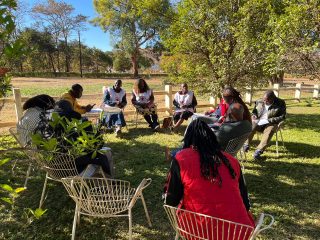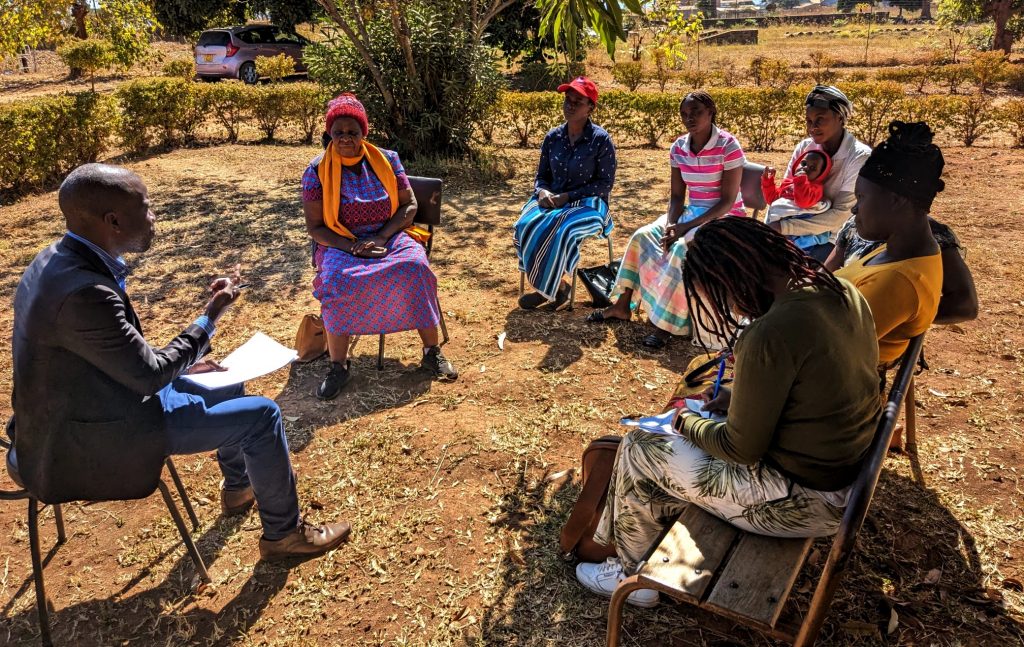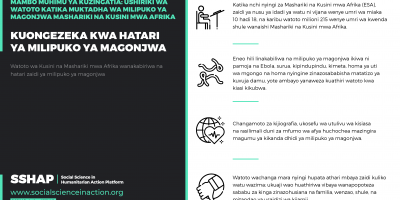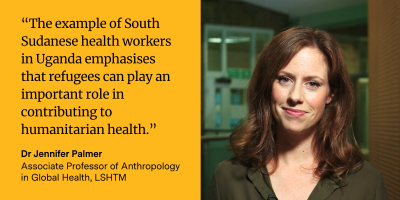Why focus on rapid qualitative assessments?
The voices of communities who are most affected by a crisis deserve to be heard. Qualitative methods are one of the best tools for capturing those voices during fast moving emergency response operations that require equally rapid data collection and analysis methods.
Both quantitative and qualitative assessments are needed to inform emergency response operations. However, it is our experience that qualitative methods are the most frequently neglected methodology due to lack of social science researchers trained in producing timely and operational findings.
We believe this is a fundamental problem for a people-centred emergency response agenda. By doing qualitative assessments, decision-makers within the response can understand contexts better. This can then help them to strengthen community awareness, preparedness and response. It can also guide the tailoring of strategies and approaches according to people’s needs, capacities, and (existing) resilience mechanisms.
Affected populations often interpret, accept and and/or adhere to emergency response recommendations based in part on their understanding and perception of the threat, their level of trust in public institutions, existing socio-cultural norms (e.g., health-seeking behaviour), customary practices, their historical past and their physical, financial and social capacity to act. Qualitative methods, which utilise a more open and participatory structure, can be a key source of this type of information.
In the context of multiple, concurrent crises in the East and Southern Africa region, members of the Collective Service – the International Federation of Red Cross and Red Crescent Societies (IFRC), United Nations Children’s Fund (UNICEF), and the World Health Organization (WHO) – are working with partners such as the UK Public Health Rapid Support Team (UK-PHRST), the Social Science in Humanitarian Action Platform (SSHAP), and the US Centers for Disease Control (CDC) with a common ambition: to provide people-centred – rapid – qualitative findings to inform community engagement strategies and hold response actors accountable to affected populations.
Assembling and piloting
The Collective Service has developed a comprehensive and open source social science training package to develop needed expertise and, at the request of UN partners and government ministries, have been piloting the training throughout the East and Southern African Region (ESAR).
In April 2023, members of the training team and associated partners presented a session during the Humanitarian Networks and Partnerships Week (HNPW) titled Leveraging Social Science for Community Engagement in Humanitarian Action. 10 Key Messages were presented during that session on how to best leverage the explanatory and contextually relevant power of social sciences for emergency response – one of those messages is the need to invest in long-term positions and expertise to rapidly collect, analyse and use community data.
Since January 2023, the Collective Service in ESAR has been using rapid qualitative assessments (RQAs) to understand and react to key community concerns in cholera responses in Malawi, Mozambique, Zimbabwe, Zambia and Comoros. Recent trainings offered by the Collective Service have focused on developing national capacity to undertake RQAs. The most recent and comprehensive iteration of this training occurred in Zimbabwe from 10 to 14 June 2024.
Building national capacity and collaboration in Zimbabwe
Twenty-two participants based in locations stretching from Harare to the southern district of Bulilima (bordering Botswana) travelled to Mazowe, Zimbabwe to attend the 5-day intensive training course on Rapid Qualitative Assessments for Emergency Response. The training participants were – deliberately – a diverse mix of university researchers (e.g., University of Zimbabwe, Africa University, National University of Science and Technology), government employees (e.g., Ministry of Health and Child Care), and local organisations (Apostolic Women Empowerment Trust, Cordaid, Oxfam, Muthengo Development Solutions, Nutrition Action Zimbabwe, Zimbabwe Red Cross). All participants were interested in learning about how to conduct an RQA and to do so as a key resource partner for an emergency response.
Participants were selected not only for their diversity in expertise and geographic locations, but also the range of organisational affiliations required to model the workforce of skilled local researchers and field practitioners necessary for coordinating ‘data to action’ response efforts. The RQA training presented an opportunity for UNICEF-Zimbabwe (as one of the core sponsors of the course) to pursue their vision of strengthening UN-government-academic partnerships to undertake localised social and behaviour change (SBC) activities.
“I appreciate the efforts to strengthen RCCE evidence generation capacity which has included participants from different sectors in line with the government’s multi sectoral approach.”
Paul Chinakidzwa, Deputy Director Health Promotions, Ministry of Health & Child Care, Zimbabwe

The training
This practice-oriented training has a curriculum that takes participants through the steps in conducting an RQA – from design and development, to presentation of results and advocacy for uptake of recommendations. Specifically, the training covered risk communication and community engagement (RCCE) principles for emergency response, qualitative methods, and RQA. Participants worked in small teams to identify key gaps in two emergencies facing Zimbabwe today (cholera and drought) and to develop topic guides and data collection tools for these response operations. The teams practiced utilising their tools with Red Cross volunteers prior to collecting data in health facilities in Mazowe. The final day of the training was dedicated to the rapid analysis of key findings and presentation skills to package recommended actions for specific emergency response pillars. This training will be followed-up by a second intensive training course (to be held in July 2024) more specifically focused on rapid data analysis and operationalisation of social science insights.
“When every minute counts, context is everything. The RQA training taught me to harness the power of rapid qualitative assessments to inform swift and effective action, digging deeper to gather meaningful data and make informed decisions that truly make a difference. Now I’m able to adapt RQA techniques in an emergency to develop people-centered solutions that are not only swift but also relevant, sustainable and community-driven.”
Tariro Faith Mukupe, Data Analyst, Muthengo Development Solutions, Zimbabwe
The next crises
We believe that those most affected by crises deserve to have their voices heard and that RQAs are one of the best methods for capturing these crucial insights. Recent findings from RQAs in Zimbabwe have triggered joint pillar action planning and created demand for social data in response to maximising current coordination and planning around the El Niño drought response.
RQAs can play an important role in planning for anticipated La Niña related events later this year. However, this requires humanitarian and health organisations to work closely with governments to ensure investment in long-term and surge capacity human resources to rapidly collect, analyse and use community data – as a preparedness activity – to be ready to respond to the next crisis.
Interested in learning more about RQAs for emergency response?
With generous support from the Gates Foundation and The Rockefeller Foundation, assessments have recently been conducted in Zambia and Malawi with high-level engagement and interest from Ministries of Health & Disaster Response. The Rapid Research Evaluation and Appraisal Lab (RREAL) also has resources, tools, and training to facilitate rapid research for health and complex emergencies.
Members of the training team will be hosting a panel discussion on ‘Integrating anthropology/social science approaches into epidemic outbreak response’ at the American Society of Tropical Medicine & Hygiene Annual Meeting, 13-17 November 2024 (session date and time TBC).





